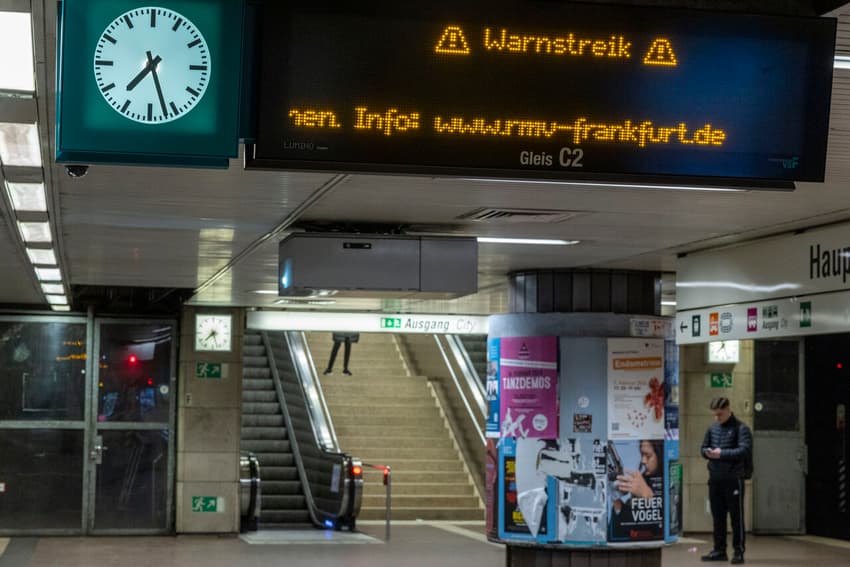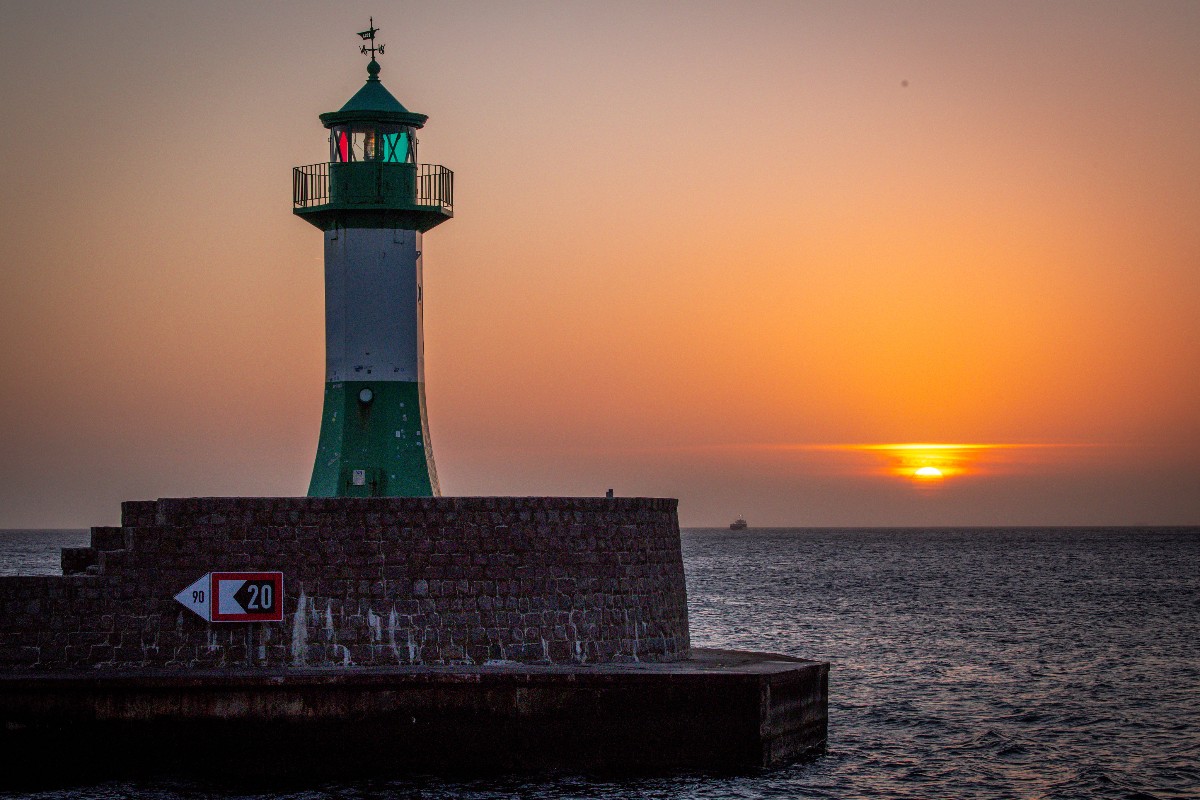Living in Germany: More strikes, German habits and the path to dual citizenship for all

This week we get into the never-ending strikes, German habits and the rocky road to the government allowing dual citizenship for everyone naturalising as German.
Living in Germany is our weekly look at some of the news and talking points in Germany that you might not have heard about. Members can receive it directly to their inbox on Saturday.
Why is Germany still in strike mode?
Whether you’re trying to catch a train, a bus, a plane or getting stuck behind a protesting farmer’s tractor - you’ve probably been caught up in the industrial action taking over Germany right now. There have been a whole lot of strikes recently as unions fight for better conditions and pay for workers amid rising inflation. The latest strikes this week saw public transport across Germany - except Bavaria - come to a standstill on Friday due to a strike called by the Verdi trade union. The same union urged security staff to walk out of several airports on Thursday, grounding flights and affecting the travel plans of tens of thousands of passengers (including a member of The Local team). Meanwhile, unhappy farmers protesting the government’s agricultural policies are still taking part in action such as blocking roads or other transport hubs.
Just what is going on? Some have joked that Germany feels a bit like France - which is well known for its strikes - at the moment. What we’re seeing - mostly - is collective agreements from unions in action. As negotiations get going, so-called ‘warning strikes’ are held as a tactic to get employers to cave to consider demands and put satisfactory offers on the table. As is the case with the German Train Drivers’ Union (GDL), sometimes union members can vote for unlimited strikes which means they become longer and cause more disruption (although, luckily, the GDL and Deutsche Bahn are back round the negotiating table currently). The disputes between employers and unions are pretty tough this year because of the steep rise in living costs in Germany. So we can expect to see a few more strikes down the line in everyday services as well as other industries. And it just might be worth joining a union if your industry is involved in one to try and get better conditions for yourself and colleagues.
Tweet of the week
There are times when 🇩🇪 language brings me to the brink of despair. Then I seek solace from M. Twain.
"Whenever the literary German dives into a sentence, that is the last you are going to see of him till he emerges on the other side of his Atlantic with his verb in his mouth."
— I am Germany (@germany_iam) January 31, 2024
This quote captures the beauty - or despair - of the German language
Germany in Focus podcast
This week we get into the latest on strikes, the law changes and events in Germany this February and the habits foreigners acquire while living in Germany. Have you gone native and want us to read it out on the podcast? Let us know by emailing [email protected]
Check it out here or wherever you get your podcasts. Please leave a review and a rating or let us know your feedback.
Where is this?

Photo: DPA/Jens Büttner
Although still cold and super windy, the weather has been bright and beautiful in much of Germany in the last few days. This photo was taken as the sun came up on Friday at Sassnitz, Mecklenburg-Western Pomerania.
Did you know?
Germany’s landmark dual citizenship reform passed through the Bundesrat on Friday after being voted through parliament in January. It means that everyone naturalising as German will finally be allowed to hold more than one nationality. It will also allow people to apply for citizenship after five years rather than eight. But did you know that naturalisation laws in Germany have been a major source of conflict over the years? It’s fair to say that Germany has had fairly strict limits to holding dual or multiple citizenship when compared to other countries. These have had a large impact on many foreigners in Germany, including the so-called ‘guest worker’ generation who were mainly Turkish residents who were urged to come and work in Germany after the war and stayed. The laws have also had a big effect on Germans who were forced to give up their German passport when naturalising abroad.
As Aaron Burnett wrote in this article exploring the history of citizenship laws in Germany, “By the 1990s, many children of the guest worker generation had been born and educated in Germany, and worked in Germany while still holding foreign – often Turkish citizenship – and not German citizenship. A 1993 legislation finally allowed people resident in Germany for at least 15 years to naturalise as German. The catch though, is that becoming a German by choice then required the naturalising person to give up any other nationalities they might have. Many opted not to.”
The debate continued throughout the years, resulting in some hurdles reduced - but dual nationality remained the exception. This is why the current reform, which is set to come into force later this year, is being called an historic moment. It gives recognition to the people who came to Germany - such as the ‘guest workers’ and the so-called contract workers who came to East Germany - from outside Europe, to help build the country up. As migration expert Zeynep Yanasmayan told the Germany in Focus podcast recently: “This law actually made a very open recognition of what these people have sacrificed to build Germany. And I think that also has an impact in terms of the emotional aspect of it."
Comments
See Also
Living in Germany is our weekly look at some of the news and talking points in Germany that you might not have heard about. Members can receive it directly to their inbox on Saturday.
Why is Germany still in strike mode?
Whether you’re trying to catch a train, a bus, a plane or getting stuck behind a protesting farmer’s tractor - you’ve probably been caught up in the industrial action taking over Germany right now. There have been a whole lot of strikes recently as unions fight for better conditions and pay for workers amid rising inflation. The latest strikes this week saw public transport across Germany - except Bavaria - come to a standstill on Friday due to a strike called by the Verdi trade union. The same union urged security staff to walk out of several airports on Thursday, grounding flights and affecting the travel plans of tens of thousands of passengers (including a member of The Local team). Meanwhile, unhappy farmers protesting the government’s agricultural policies are still taking part in action such as blocking roads or other transport hubs.
Just what is going on? Some have joked that Germany feels a bit like France - which is well known for its strikes - at the moment. What we’re seeing - mostly - is collective agreements from unions in action. As negotiations get going, so-called ‘warning strikes’ are held as a tactic to get employers to cave to consider demands and put satisfactory offers on the table. As is the case with the German Train Drivers’ Union (GDL), sometimes union members can vote for unlimited strikes which means they become longer and cause more disruption (although, luckily, the GDL and Deutsche Bahn are back round the negotiating table currently). The disputes between employers and unions are pretty tough this year because of the steep rise in living costs in Germany. So we can expect to see a few more strikes down the line in everyday services as well as other industries. And it just might be worth joining a union if your industry is involved in one to try and get better conditions for yourself and colleagues.
Tweet of the week
There are times when 🇩🇪 language brings me to the brink of despair. Then I seek solace from M. Twain.
— I am Germany (@germany_iam) January 31, 2024
"Whenever the literary German dives into a sentence, that is the last you are going to see of him till he emerges on the other side of his Atlantic with his verb in his mouth."
This quote captures the beauty - or despair - of the German language
Germany in Focus podcast
This week we get into the latest on strikes, the law changes and events in Germany this February and the habits foreigners acquire while living in Germany. Have you gone native and want us to read it out on the podcast? Let us know by emailing [email protected]
Check it out here or wherever you get your podcasts. Please leave a review and a rating or let us know your feedback.
Where is this?

Although still cold and super windy, the weather has been bright and beautiful in much of Germany in the last few days. This photo was taken as the sun came up on Friday at Sassnitz, Mecklenburg-Western Pomerania.
Did you know?
Germany’s landmark dual citizenship reform passed through the Bundesrat on Friday after being voted through parliament in January. It means that everyone naturalising as German will finally be allowed to hold more than one nationality. It will also allow people to apply for citizenship after five years rather than eight. But did you know that naturalisation laws in Germany have been a major source of conflict over the years? It’s fair to say that Germany has had fairly strict limits to holding dual or multiple citizenship when compared to other countries. These have had a large impact on many foreigners in Germany, including the so-called ‘guest worker’ generation who were mainly Turkish residents who were urged to come and work in Germany after the war and stayed. The laws have also had a big effect on Germans who were forced to give up their German passport when naturalising abroad.
As Aaron Burnett wrote in this article exploring the history of citizenship laws in Germany, “By the 1990s, many children of the guest worker generation had been born and educated in Germany, and worked in Germany while still holding foreign – often Turkish citizenship – and not German citizenship. A 1993 legislation finally allowed people resident in Germany for at least 15 years to naturalise as German. The catch though, is that becoming a German by choice then required the naturalising person to give up any other nationalities they might have. Many opted not to.”
The debate continued throughout the years, resulting in some hurdles reduced - but dual nationality remained the exception. This is why the current reform, which is set to come into force later this year, is being called an historic moment. It gives recognition to the people who came to Germany - such as the ‘guest workers’ and the so-called contract workers who came to East Germany - from outside Europe, to help build the country up. As migration expert Zeynep Yanasmayan told the Germany in Focus podcast recently: “This law actually made a very open recognition of what these people have sacrificed to build Germany. And I think that also has an impact in terms of the emotional aspect of it."
Join the conversation in our comments section below. Share your own views and experience and if you have a question or suggestion for our journalists then email us at [email protected].
Please keep comments civil, constructive and on topic – and make sure to read our terms of use before getting involved.
Please log in here to leave a comment.